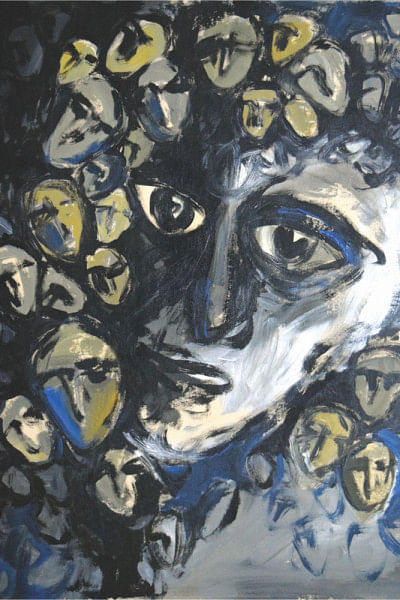Don't Be a Bystander

A few days ago, I was near the diplomatic zone in the city looking for a particular building, and I had to move from street to street. Upon reaching one particular street, I saw some rapid movement amongst two people. As I moved closer, I noticed a man pulling a woman's hair and throwing her to the ground. My heart froze. He kicked at her mercilessly and beat her with his sandals. I jumped out of my car and screamed! At that moment, the vile man shifted his look towards me, while the woman got some time to get back up. I threatened to call the police, the woman begged me to. I ran to the police I had noticed on the previous street.
When I came back with a responsive policeman, I realised that there were people around the whole time. I was so panicked at what was happening; I missed the worst part of the situation- the bystanders- watching what was happening, hypnotised by what they feel is entertaining, not moving a muscle to save the woman, not straining their vocal chords to speak out against injustice.
Their faces disgusted me to my very gut. I shouted at them all- around five to six men and one woman. I called them all criminals as I left the place exasperated, shocked, scared. What have my people become?
Still shaking with some form of anxiety, I came to the office and had to find out why it was that people just stand and just watch injustice take place, why sights of violence and crime paralyses our souls along with our bodies.
The internet introduced me to the bystander effect.
Also known as the bystander apathy, or the Genovese syndrome, is a social psychological phenomenon that refers to cases in which people do not offer any means of help to a victim, even when the act of violence or crime is taking place right in front of them. Several variables help to explain why the bystander effect occurs. These variables include: ambiguity, cohesiveness and diffusion of responsibility.
The study on this phenomenon began after a horrifying incident back in 1964- the murder of Kitty Genovese in front of thirty-seven people. That incident began raising questions, questions similar to the ones I asked when I saw that woman being struck, out on the open streets, in the middle of a bright, sunny day, with so many people standing around her- how could so many people look on and turn away as she was being attacked? What did that collective inability to act reveal about ourselves, our communities, and our belief systems? 52 years on, the notion of the bystander effect, and why we continue to look away in the face of danger, remains a terrifying and cruel reality.
Even in 2010, a Guatemalan homeless man saved a woman from being attacked, only to be stabbed multiple times himself. While he lay there in a pool of blood, some people walked by, some stared for a while, some shook and left, and some videotaped the whole incident- something we have now become very familiar with after the video of Rajon's death all over social media.
John Darley and Bibb Latane were the two social psychology researchers who published a series of papers beginning in 1969, on this unwanted phenomenon. They wanted to show why the witnesses to Genovese's murder, a case both researchers followed avidly, behaved with such indifference, and whether they could calculate a minimum number of people present to create a shared uncertainty.
Diffusion of responsibility can manifest itself in such situations, which leads to a group of people who, through action or inaction, allow events to occur which they would never allow if they were alone. This is referred to as 'groupshift' – or ‘mob-mentality’.
What Darley and Latane observed through their research is that the probability of help is inversely related to the number of bystanders, as in the greater number of people that are present during the act of violence, the greater chance of inaction.
But this is not a problem we can collectively solve. This can only be tackled on an individual level. We first have to improve our own characters and there are plenty of ways to do that. Unless and until we know ourselves, unless we learn to recognise the gravity of situations of injustice, unless we learn how to use our emotions and intellect together, and until we put our morals to good use- nothing will change and we will be our own destruction as a nation. It is time to speak out against any injustice, in any place, against anyone. It is time for us to rise and stand up for each other.

 For all latest news, follow The Daily Star's Google News channel.
For all latest news, follow The Daily Star's Google News channel. 



Comments